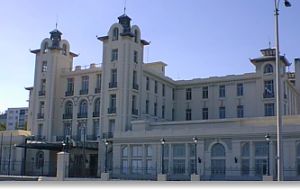MercoPress. South Atlantic News Agency
Mercosur Parliament formally opens in Montevideo
 Mercosur headquater in Montevideo
Mercosur headquater in Montevideo The Mercosur Parliament will hold its first formal session this Monday in Montevideo when 72 elected representatives, 18 for each founding member of the group, convenes in Uruguay's Legislative Palace to discuss regional policies.
The Parliament is scheduled to meet once a month in Montevideo, its definitive seat, and members are basically honorary, they will only be paid return tickets to Montevideo and a per diem. Venezuela, the fifth member of Mercosur is also scheduled to send delegates but they will not be entitled to vote until the process of incorporation of Caracas to the group is fully accomplished. The current system will only apply until 2010, giving time to the different countries to amend their electoral legislation so that Mercosur representatives are elected by direct vote and not by their pars in this transition period. Members of other parliaments, Central America, Andean Community and the European Union have been specially invited to Monday's ceremony. The idea of a Mercosur parliament has been around for years but was stalled for years given junior members fears of loosing influence to senior members. However, the issue begun to be seriously considered in 2003 and finally consolidated in 2006 when the incorporation of Venezuela to the customs union group. In effect it has been agreed that in 2009 the Mercosur parliament will have to address the representation system and internal mechanisms to ensure all country members have an equal say. Under direct proportional representation Argentina and Brazil will necessarily have more parliamentarians than Uruguay and Paraguay, but in crucial votes, there must be guarantees for junior members protecting them from potential collusion of the senior members and their interests. "A mechanism of special majorities of parliamentarians and countries has to be worked out, basically a quasi consensus system, or qualified majority for decision making, which ensures the democratic essence of parliament", said Uruguayan deputy Enrique Pintado. The Mercosur Parliament will draft bills which once approved must be later ratified by the different country members. This means the bills will have to be considered by each country's legislative, but under a "fast track" system they will be permanently monitored and must be approved or sent back to Mercosur parliament in 180 days. "This new approach means the current procedure of accumulating Mercosur protocols and agreements, which sometimes remain forgotten for years, will have to be constantly addressed and updated. I think it's a great leap forward for the integration spirit without razing national interests", added Pintado.




Top Comments
Disclaimer & comment rulesCommenting for this story is now closed.
If you have a Facebook account, become a fan and comment on our Facebook Page!